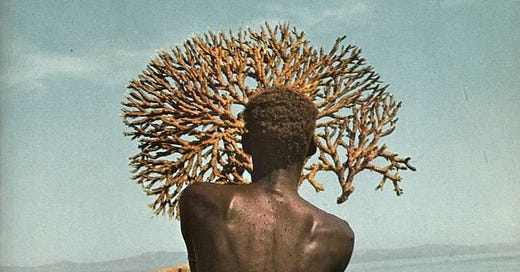Yesterday my mother told me a story about her father—Sulemana. The name Sulemana was composed within is Gondo. People of the Gondo family championed the lion as a totem. Gondo people charged forward like lions—they swallowed their fears—they did not back down. My grandfather was from Burkina Faso and muslim. He was 15 years old when his mother discovered a plot within their family to sacrifice him to a lion.
You see, every 4 months, the people of Gondo committed to sacrificing one child to the Great Lion of the plains in exchange for good fortune in their hunts and blessings for their feasts. So, when the time had come for another child of Gondo to be sacrificed, the elders of the village would send that child on one of three quests: fetch water from the Volta, collect firewood from the Bush, buy kolanut from the market.
They would send this child right before dusk so that when that child returned at dark, there would be no one outside to let that child into their homes. But the child would think nothing of it, since it was not unusual for the children to sleep on top of the homes at times to get relief from the heat of the houses. And so the child will climb to the top of the house, just to discover no one there. They will lay down to rest anyway, thinking maybe the children will come to join them later on that night. No one did come of course, no one except for that insatiable lion (you would think he’d had his fill of children by this time).
Being an adult, Sulemana’s mother knew all of this. And as a woman, she was spared from this fate since the Gondo required wombs to repopulate the village. One day on her journey back from fetching water at the river, she overheard the village elders making arrangements for the next child sacrifice:
“That Sulemana boy is too handsome and skilled for someone so young. It must be him.”
“Such gifts do not come from any god we know.”
“We must give him up now before he rises and takes to us with a cutlass in our sleep!”
“Or before he steals our wives!”
“Then it is decided. Once his mother returns from the river we will instruct him to go fetch her more water.”
Shocked and heartbroken, his mother ran as fast as she could with the pot of water on her head back to the village.
“Sulemana! Sulemana!”
“Child, come to me now!”
When he came she took his face between her palms, crying inside of her. She knew today would be the last she ever saw her beautiful son.
“Sulemana. I want you to take this leg of meat to the Volta and trade with the ones who come from beyond the bend. Trade it for salt and kola nut—an equal weight of each. Once the trade is finished, follow the people from where they came and never come back.”
Sulemana was now the one with tears in his heart. He heard the screams of children at night but never once dared to ask since no one spoke of it come morning. Was it his time? He knew his mother would never send him to an early grave and so, he obeyed. He took the family donkey his mother offered and started to make his way. When the elders returned, they asked Sulemana’s mother where the child was.
“I sent him to go fetch more water for me from the river.”
Pleased, the elders thanked their god for such fortuous luck.




